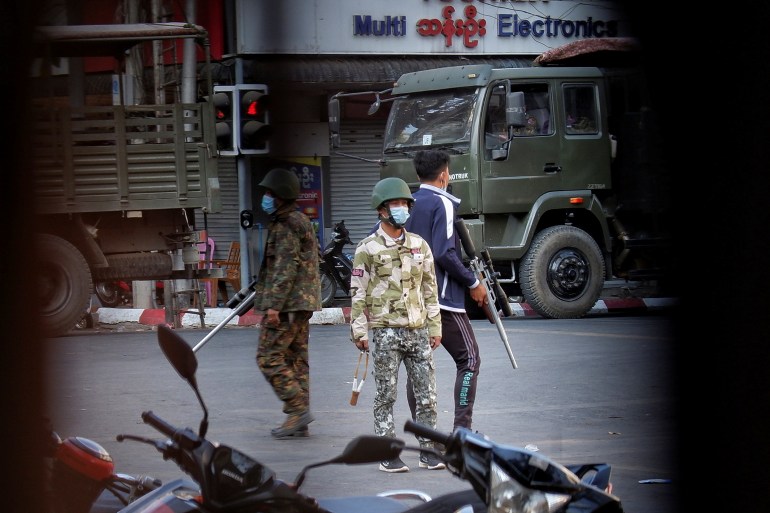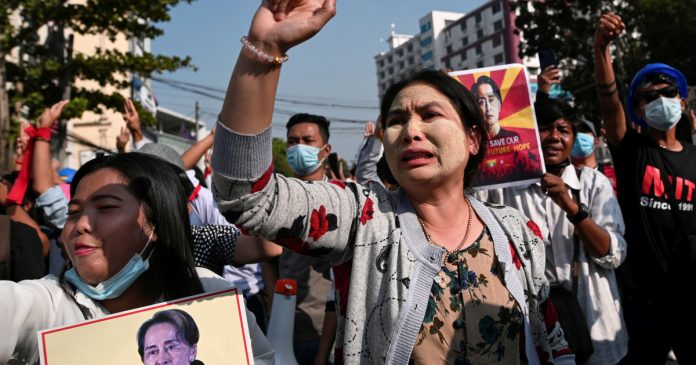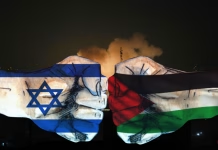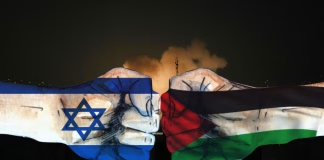[ad_1]
Blackout follows 10th day of protests marked by prominent military presence and use of force in Mandalay.
Myanmar was plunged into a second internet blackout on Monday night after the 10th day of demonstrations against the military coup marked by an increased presence of troops and injuries in Mandalay, the country’s second-biggest city, after police used force to break up a protest.
Internet monitoring group NetBlocks said connectivity dropped to 15 percent of the standard levels overnight.
“#Myanmar is in the midst of a near-total internet shutdown for a second consecutive night,” as of 1am local time (18:30 GMT), NetBlocks tweeted early on Tuesday morning.
The United Nations warned the military of “severe consequences” for tough action against the protesters, and condemned the internet restrictions.
“Ms Schraner Burgener has reinforced that the right of peaceful assembly must fully be respected and that demonstrators are not subjected to reprisals,” UN spokesman Farhan Haq said in New York.
“She has conveyed to the Myanmar military that the world is watching closely, and any form of heavy-handed response is likely to have severe consequences.”
In an account of the meeting, Myanmar’s army said Soe Win, the regime’s second in command, had discussed the administration’s plans and information on “the true situation of what’s happening in Myanmar”.
People have been on the streets for days demanding the military, who seized power in a coup on February 1, step down and free the country’s elected leaders including 75-year-old Aung San Suu Kyi. She has been charged with the illegal possession of walkie-talkies and is expected to appear in court by video-link on Wednesday.
At least two people were slightly wounded during Monday’s protests when police in the city of Mandalay used rubber-coated bullets and catapults to break up a protest, media and residents said.
Demonstrators threw bricks, said a rescue team member who assisted with the injured.
“One of them needed oxygen because he was hit with a rubber bullet in his rib,” rescue team head Khin Maung Tin told the AFP news agency.
 At least two people were hurt in Mandalay when soldiers and polices used rubber-coated bullets and catapults to break up a protest [Stringer/Reuters]
At least two people were hurt in Mandalay when soldiers and polices used rubber-coated bullets and catapults to break up a protest [Stringer/Reuters]
Journalists on the scene also said police had beaten them.
A demonstration led by student groups in Naypyidaw, the country’s military-built capital, was also met with force after the gathering had retreated. Police also arrested dozens of the young protesters, although some were later released.
Coup leader General Min Aung Hlaing told a junta meeting on Monday that authorities were trying to proceed softly, but warned: “Effective action will be taken against people who are harming the country, committing treason through violence.”
As well as the demonstrations in towns and cities, civil servants including doctors and teachers have gone on strike as part of a civil disobedience movement that has crippled many functions of government.
The army has been carrying out nightly arrests and has given itself enhanced search and detention powers through amendments to the colonial-era Penal Code.
The Assistance Association for Political Prisoners (AAPP), which is tracking detentions, expressed concern that internet blackouts could be used to “commit unjust activities including arbitrary arrests.” It said at least 426 people had been picked up since the coup and 391 remained in custody.
The group said the latest amendments to the Penal Code made the law more “arbitrary” and were “aimed at the civil disobedience movement” noting that the changes could allow the military to target pamphlets, protest banners and even songs. People found guilty of such offences could face as long as 20 years in prison, the AAPP added.
Aung San Suu Kyi’s party won a 2015 election and another on November 8 – increasing its majority – but the military claimed the vote was fraudulent and used that complaint to justify its coup. The electoral commission has dismissed accusations of fraud.
Aung San Suu Kyi spent nearly 15 years under house arrest during the previous military regime.
[ad_2]
Source link











